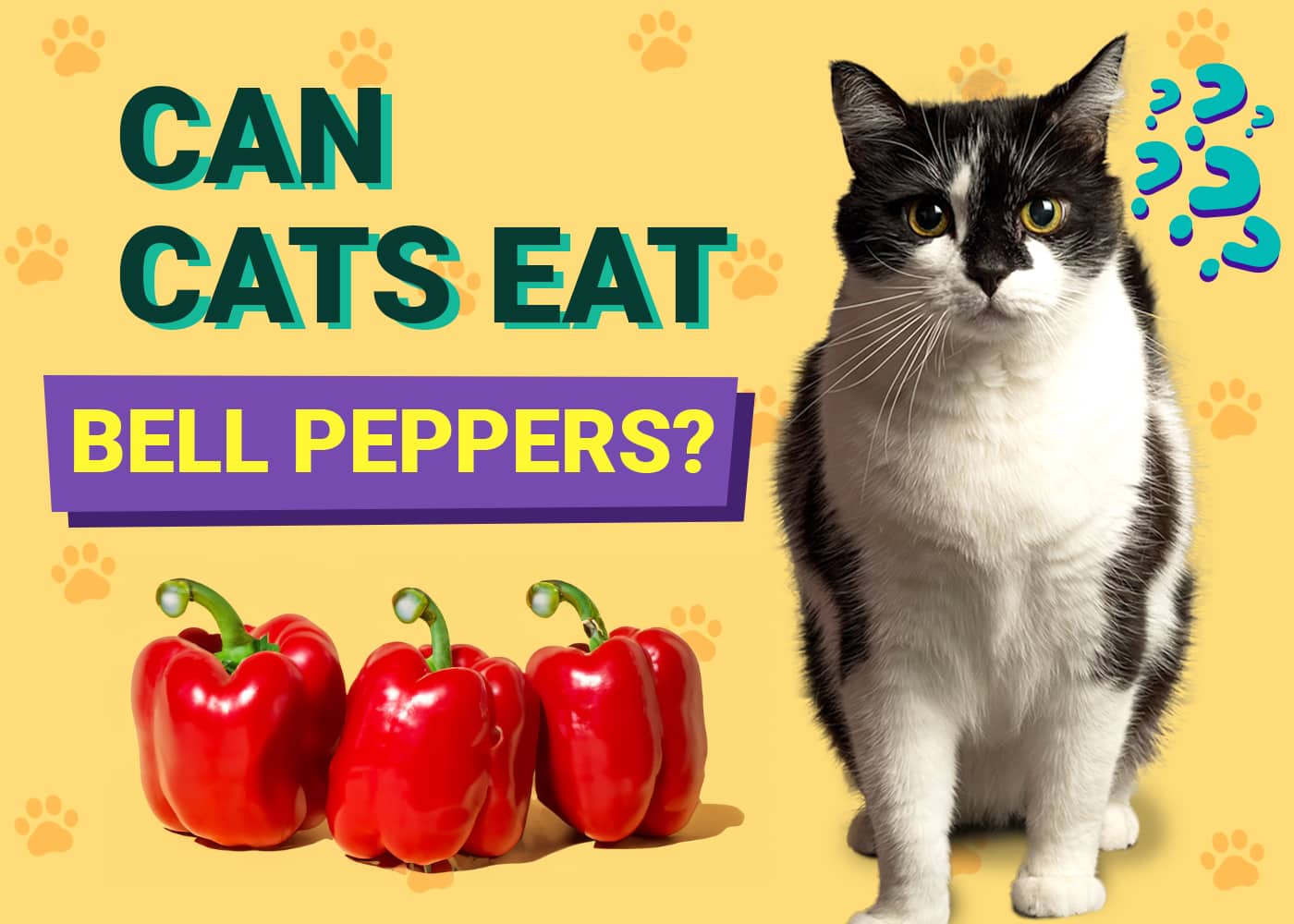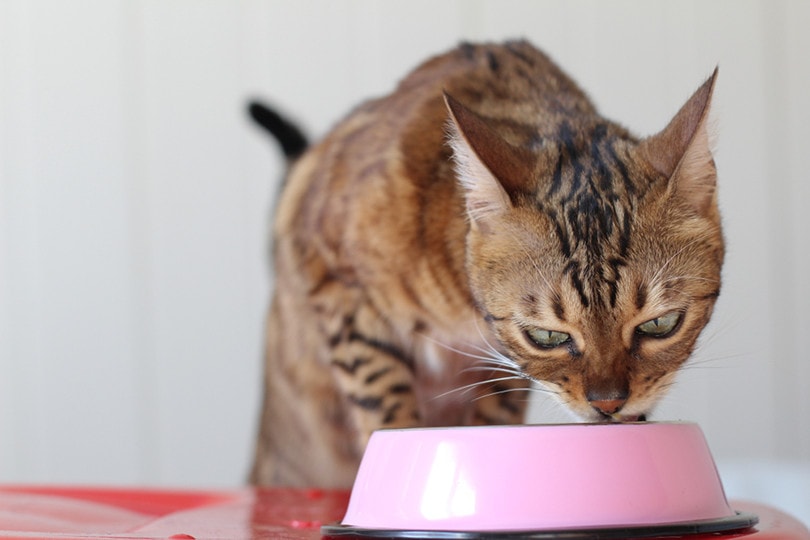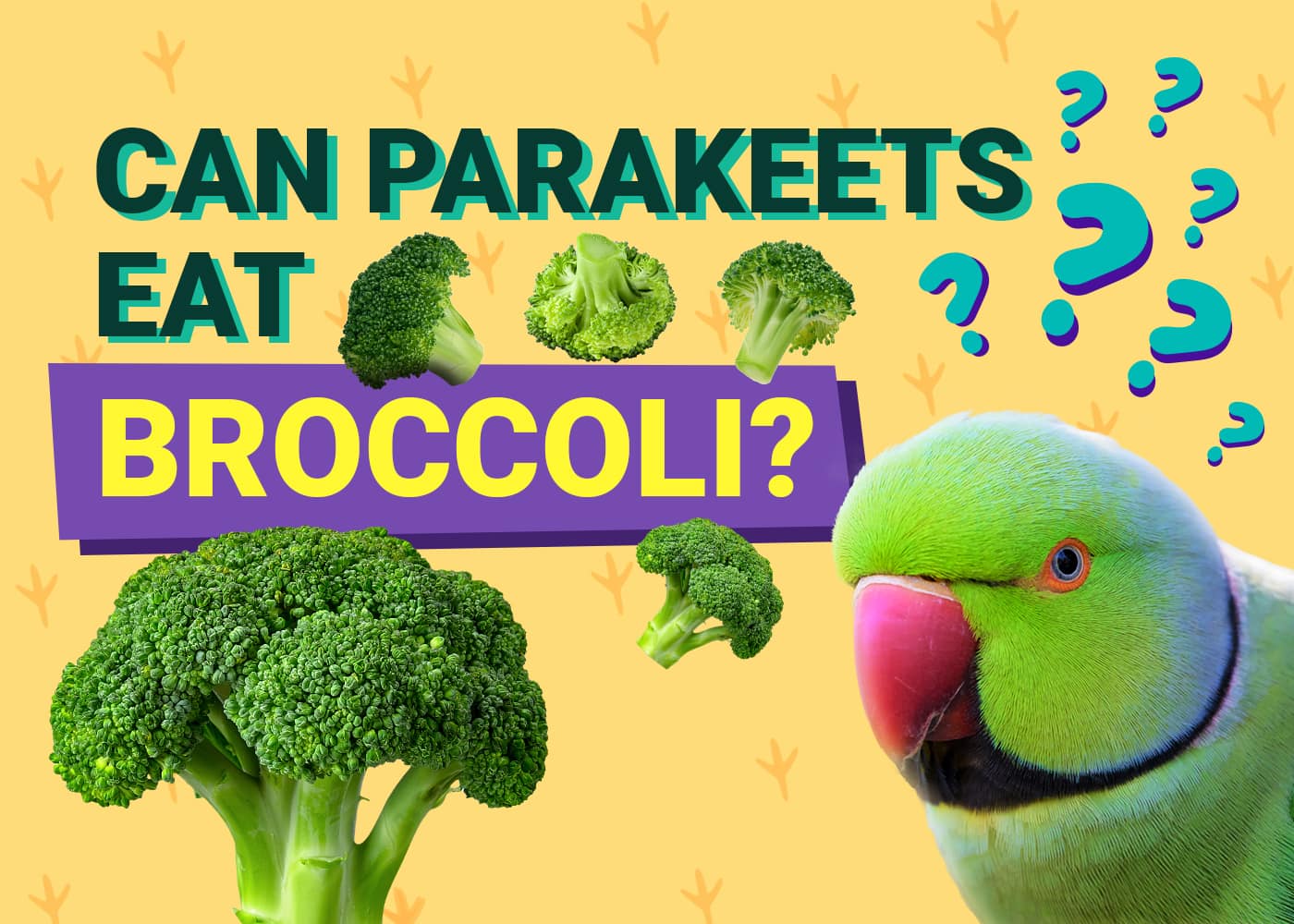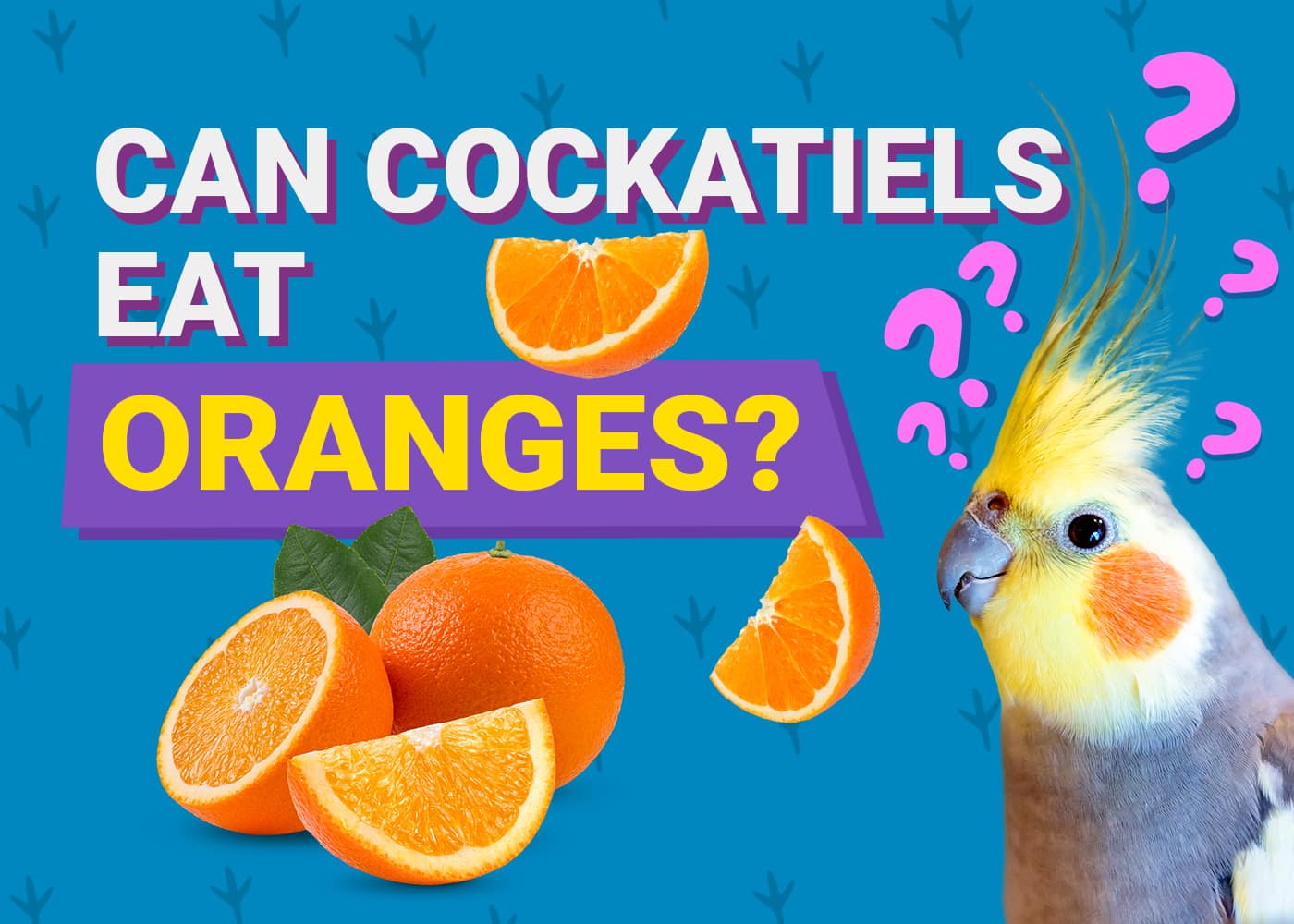VET APPROVED

The information is current and up-to-date in accordance with the latest veterinarian research.
Learn more »Click to Skip Ahead
Who doesn’t enjoy a bit of bell pepper in your salad or other tasty dishes? These staples of the kitchen are yummy and put a dash of color in our lives. Like most things found in our kitchen, bell peppers can attract your pets. It’s not unusual for curious kitties to try and sneak a bite here and there. That leaves cat owners asking if cats can eat bell peppers. The answer to that question is yes, bell peppers are not toxic to cats. However, like with most human foods, they should only be given in moderation.
Let’s learn more about cats, bell peppers, and what your kitty should be eating normally.

Can Cats Eat Bell Peppers?
Cats are true obligate carnivores. They have evolved over the years to get all their nutritional needs from the meat they hunt, or from food provided by their owners. This includes their vitamins and minerals, which are what bell peppers provide humans. This is why most cats prefer to eat the kibble or wet food they are provided. It’s also the reason why feral cats or those without a home hunt for their food instead of attacking your vegetable garden. The vitamins and minerals inside the veggies aren’t needed by your cat, but that doesn’t mean they can’t help out a bit.
Considering that bell peppers of all colors aren’t considered toxic, they are safe for your kitty to have in moderation. However, you should keep in mind that cats have a bit of difficulty digesting veggies, carbs, and nuts. This is why if your cat enjoys a few bites of bell pepper, you shouldn’t go overboard. Occasionally, your kitty can enjoy a taste, but not daily or as part of their regular diet.
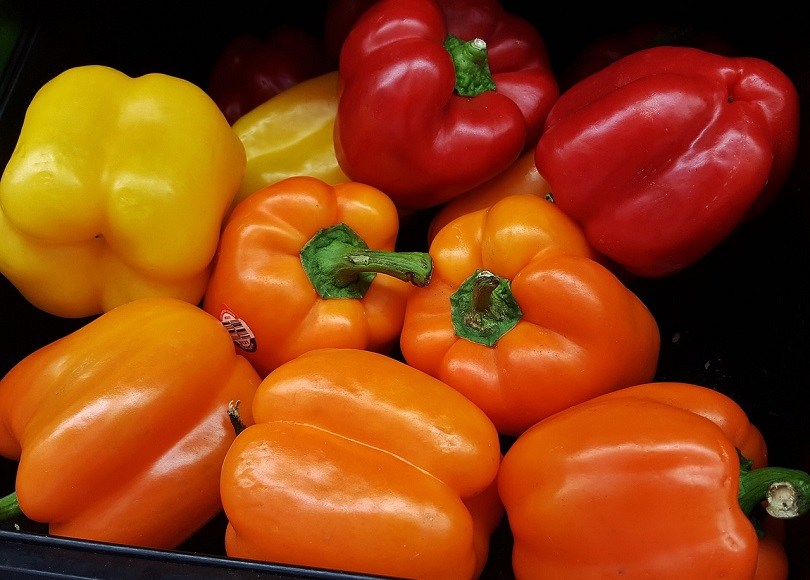
Are There Benefits of Feeding Bell Peppers to a Cat?
While your cat doesn’t require secondary vitamins and minerals from bell peppers, that doesn’t mean they can’t be eaten, in moderation, for a few added benefits. Let’s take a look at those benefits below so you’ll have a better understanding of the relationship between cats and bell peppers.
Bell peppers contain a variety of compounds that have biological properties. Though this fruit has not been specifically studied in cats for these purposes, data is indicating that peppers can exhibit antibacterial, antifungal, and antioxidant properties. This doesn’t necessarily mean that any species (human or cat) that eats them will derive these specific benefits, but in general, it means that eating bell peppers probably isn’t going to be a bad idea, and they may have some potential benefits, as well. The compounds they possess may also have the potential to help with cancer prevention and protect brain function. Therefore, as a whole, these mighty fruits (or more commonly vegetables) might be worth consideration if your cat seems keen!
Interesting preliminary data in other species may have long-term implications for cats, as well. One study in rodents found that extracts from bell peppers may have potential implications in blood glucose levels, and also may aid in preventing weight gain. Superfood, indeed!
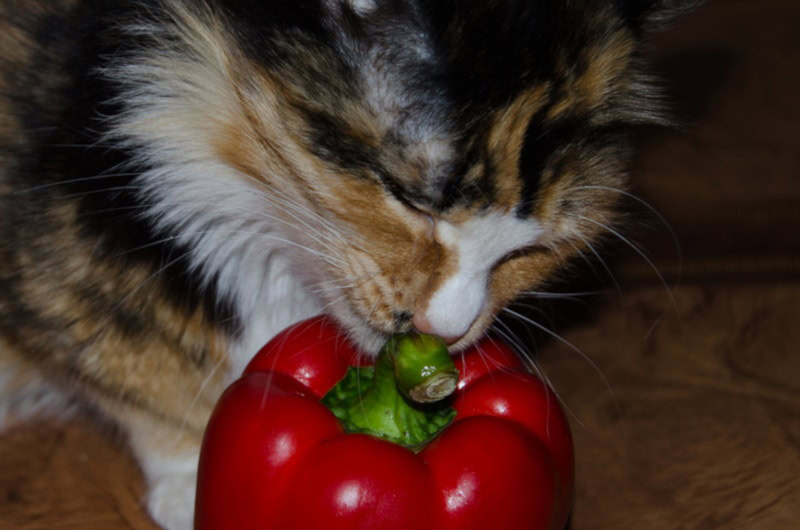
The Risks of Bell Peppers
As we’ve mentioned, bell peppers aren’t toxic to cats. We’ve also stated that your cat should only eat bell peppers in moderation. But why? The answer is simple: your cat’s digestive system. Cats can digest meat and get the needed vitamins and minerals from this meat easily. Unfortunately, that’s not the case when it comes to vegetables like bell peppers. A cat’s digestive tract is specialized to digest animal protein, meaning other foods such as vegetables may cause gastrointestinal upset and certainly aren’t as effective at meeting cats’ unique nutritional needs.
You’ll also need to keep choking hazards in mind when it comes to bell peppers and your cat. If your cat enjoys these veggies, you can safely feed them a few bites now and then. However, it’s important to remember bell peppers aren’t very tender. This can present a choking hazard for your cat. You’ll also want to steer clear of the stems and plant parts. To minimize this risk, boil or cook your kitty’s bell peppers without any added seasonings.
- NO MESS - The 360° tray on this cat food and water bowl set has a raised design to catch and...
- WHISKER FRIENDLY - Shallow and wide metal containers with flat bottoms ensure your kitty can enjoy...
- CHEW-SAFE MATERIALS - Kittens and cats love chewing on silicone and soft rubber - but it's a choking...
Knowing exactly what your feline companion can and cannot eat will help you become the best pet parent. Recognizing that not all cat bowls are equal is also key! The Hepper NomNom Cat Bowl sets itself apart from traditional options by catering to the specific needs of cats. The innovative design offers whisker relief via shallow dishes and promotes digestion with a slight bowl elevation. Find out if the Hepper NomNom is right for your cat by clicking here.
At PangoVet, we’ve admired Hepper for many years and decided to take a controlling ownership interest so that we could benefit from the outstanding designs of this cool cat company!

Final Thoughts
While bell peppers are safe for cats to consume, it’s best to limit the amount they have. If your kitty shows an interest in bell peppers, let them give it a try. You never know, your kitty could be one of those that simply loves the taste of bell peppers and are constantly asking for more.
Featured Image Credit: Steve Buissinne, Pixabay
